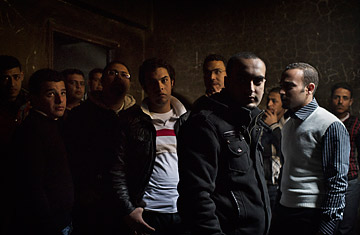
Khaled Kamel, foreground in black, and friends, in Damanhour, Egypt.
(2 of 2)
The turnout and the 18-day stand-off that ensued between protesters and the Mubarak regime rocked the Arab nation far beyond the borders of Tahrir Square. In the Egyptian bread basket of the Nile Delta, it pushed the village of Zowiya Ghazal, and the neighboring agricultural town of Damanhour to finally come to terms with their own mixed feelings about the Mubarak regime. In many ways, it exposed a generational divide, and opened up a debate over who is better suited to lead the country towards the change that many yearn to see. "I was surprised by how many people went out on Jan. 25," says Kamel's mother. She was impressed by her son's videos too. "I realized we were all on the same path of thinking about change, but they had a fast way of getting there."
Fame and the Future
On a Tuesday afternoon, Kamel and four of his friends — some fellow activists, some not — tour the burned and ransacked state security headquarters in the center of Damanhour, a few miles away from where his family's home. Destroyed on the night of Jan. 28, Egypt's nationwide day of rage, it is now an ad-hoc museum to the horrors inflicted by Mubarak's regime on the Egyptian people. Dozens of families and couples stream through its stone entryway, where someone has spray-painted "Museum of the Unjust" and "Entrance is free for the Egyptian people."
Off of one room, there is a bathroom-sized space that people are lining up to see. "It was a torture room," Kamel says. When the first morbid tourists crept in here two weeks ago, he adds, an ex-prisoner — a member of the banned Islamist Muslim Brotherhood — hung around to give tours. "There used to be an electrical box here," Kamel says, pointing to an off-colored rectangle on the wall. "They ran a cable up here into the room like this," he traces the marks on the wall, "and gave people electric shocks in here."
But inside most of the charred rooms and corridors, much is now left to imagination and memories, the files of the people held prisoner and tortured having gone up in flames when security forces abandoned their posts on Jan. 28. The writing on walls is still there — literally — in the shadows, where visitors who were once prisoners say the security brutalized their captives with dogs and electric shocks. "October 29, 2009. Abu Nuyera," reads one name — the father of a girl named Nuyera. It says he came from the village of Hosh Issa. "Al-Faragony. June 10, 2010," reads another — scrawled four days after Khaled Said was murdered 40 miles northwest of here.
An older man in the building's courtyard recognizes Kamel from his appearance on Egyptian TV. "We are so proud of you," the man exclaims. He asks Kamel to pose for a picture with him. Another man asks Kamel for his Facebook name.
Back in Kamel's living room crowded with furniture and stuffed animals, the older generations of his family are also marveling about how a formerly lost generation took the world by surprise. They were especially moved by Wael Ghonim's televised reaction to the uprising's "martyrs" last week. Kamel's grandmother "was watching the TV the whole time saying, 'Enough Mubarak, leave, after what you've done to these people.' It was very hard on her seeing the people who were killed and injured," says Maguid, Kamel's mother. From her chair on the other side of the room, Feriyal Hussein's elderly eyes fill with tears again as she listens. "I was a child when King Farouk was king," she says. "But he left peacefully. Not like this."
Maguid and Hussein consider Kamel as well as Wael Ghonim, and their online associates Egypt's newest heroes. But Kamel echoes Ghonim on that thought: everyone who took to the streets is a hero. The thing about online organizing, he adds, is that there was never a need for a leader in Egypt's youth revolution. "We all chatted, we posted our ideas on the page, and we saw each other's ideas."
And in "the new Egypt," as he calls it, Kamel will keep using his individual activism and his amateur video skills to push for change until it comes, until the country looks like a place where people can realize their dreams, he says. After that, he would like to become a film director. And his favorite movie happens to be an American one: V for Vendetta, a film about a man who uses terrorist tactics to bring down a totalitarian regime. Not that terrorism is the right strategy, Kamel adds. He has stressed repeatedly that Egypt's movement was a peaceful one, and that was crucial to its success. "I just liked that he was smarter than them, not stronger than them," he says of the film's protagonist. "Like how we used our intelligence and technology to win the fight here."
